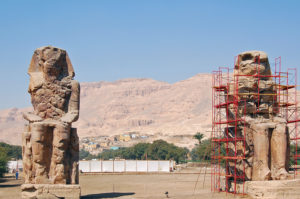
Colossi of Memnon, near Luxor, Egypt (Photo by Don Knebel)
Pharaoh Amenhotep III, the grandfather of Tutankhamen, ruled Egypt between 1388 and 1351 B.C., a period of great prosperity and cultural achievement. He was remembered with a massive mortuary temple complex on the west bank of the Nile River. Identical statues of a seated Amenhotep, each 60-feet high and carved from a single block of sandstone, guarded the entrance to his temple. How the Egyptians transported the 720-ton statues hundreds of miles from their quarry site when they did not have the wheel remains a mystery.
Over time, annual Nile flooding destroyed most of Amenhotep’s mortuary complex, but the statues survived. When Greeks under Alexander the Great conquered Egypt in the fourth century B.C., they assumed the statues represented Memnon, a mythological Ethiopian king famous for helping defend Troy in the Trojan Wars. They named the area Memnonium and called the statues the Colossi of Memnon, names they still bear. In 27 B.C., an earthquake toppled the upper half of the northern statue and people began reporting high-pitched singing emanating from the base at dawn. They attributed the singing to Eos, the goddess of dawn and mother of Memnon, mourning her son’s death at the hands of Achilles. Visitors came to the singing Colossus from all over the world, seeking divine guidance. Hearing the singing meant good fortune. In 130 A.D., Roman Emperor Hadrian visited the Colossi after the death of Antinous, his lover. Although his traveling companions heard singing, Hadrian did not. Sixty years later, Emperor Septimus Severus did not hear the singing, but repaired cracks in the northern statue’s base. No one has heard the singing since. Scientists believe dew in the cracks, drying in the morning sun, created the sounds.
Comments are closed.